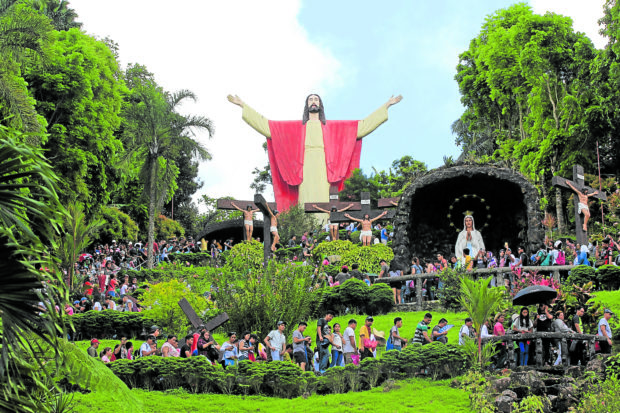In Quezon, bishop suspends Lenten rites due to pandemic

JESUS ON HILLTOP In this photo taken during Lent in 2017, pilgrims pack the pathways leading to a giant image of the Risen Christ on a hilltop at Kamay ni Hesus complex in Lucban town, Quezon province. —DELFIN T. MALLARI JR.
LUCENA CITY, Quezon, Philippines — The bishop of the Diocese of Lucena has suspended the holding of religious rites and practices during the Holy Week this year to avoid attracting crowds in churches and pilgrimage sites in the province and prevent the spread of the new coronavirus disease (COVID-19).
Bishop Mel Rey Uy, in a circular on Feb. 18, informed priests and deacons under the Diocese of Lucena that the “Visita Iglesia,” or church visits, would not be allowed during Holy Week, which will begin on March 28 and end on April 4, Easter Sunday.
Visita Iglesia is a tradition among the Catholic faithful to visit seven to 14 churches on Holy Thursday to pray or walk through the 14 Stations of the Cross.
Popular destination
The Kamay ni Hesus (KNH) shrine in Lucban town and the Minor Basilica of St. Michael the Archangel in Tayabas City are two of the most popular religious sites visited by pilgrims during the Holy Week.
The KNH shrine has become one of the most popular Lenten destinations in the country, with visitors reaching millions during the Holy Week. It was closed to devotees last year amid community quarantines and travel restrictions as the country dealt with the COVID-19 pandemic.
Article continues after this advertisementThe Tayabas church’s 103-meter (338-feet) long aisle is one of the longest in the country. The basilica was declared a national cultural treasure in 2001 by the National Museum.
Article continues after this advertisementUy also disallowed the holding of the “grand pabasa” in parish churches and encouraged families to hold them inside their homes.
The Catholic ritual of “pabasa” is the public reading of verses depicting the suffering of Jesus Christ before his crucifixion. It is carried out day and night, spanning days and usually ends on Good Friday.
Virtual staging only
The live stagings of the “senakulo,” or the dramatization of the passion of Christ, are also not allowed, Uy said.
“Only virtual staging (prerecorded) of the senakulo is allowed. The cast and production crew must follow the IATF (Inter-Agency Task Force for the Management of Emerging Infectious Diseases) guidelines prescribed for the staging,” Uy said.
A Good Friday procession will be allowed but only the image of the Santo Entierro (dead Christ) would be carried and only accompanied by priests, he said.
Confessions in churches will still be allowed provided both the faithful and the priests will follow the mandated health protocols, including the wearing of masks and the observance of physical distancing.
As of Feb. 27, Quezon, which is under modified general community quarantine status, had logged 7,246 COVID-19 cases, with 171 classified as active. It recorded 6,822 recoveries and 253 deaths.